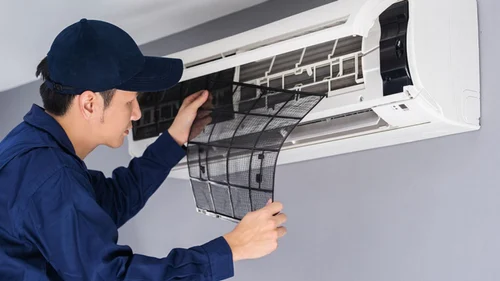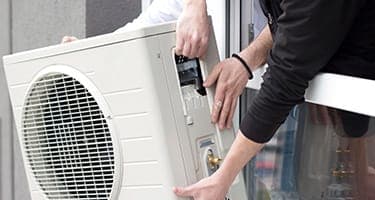An Unbiased View of Ac Air Conditioner Repair
An Unbiased View of Ac Air Conditioner Repair
Blog Article
Not known Details About Ac Fixing
AC Repair: Professional Cooling System Restoration Guarantees Your Home Remains Comfy All Year Round
Types of Air Conditioner Systems
When tackling AC repair work, comprehending the kind of air conditioning system you're handling can conserve time, money, and stress. Ever questioned why some units cool a space quicker than others? Or why certain systems seem to break down more often? Let's peel back the layers.
Central Air Conditioning
Little Known Questions About Air Conditioning Repair Near Me.
Imagine a cool breeze streaming through a whole home, whispering comfort into every corner. Central air conditioning systems do precisely that. They utilize a network of ducts to distribute cooled air, counting on a compressor and condenser outside, paired with an evaporator coil inside. When this complex beast fails, pinpointing the problem can be like finding a needle in a haystack.
Split Systems

Split systems are a popular choice for lots of homes-- part indoor unit, part outside compressor. They use flexibility and efficiency, but their double nature indicates repair can involve either part. Have you ever heard an odd sound outside your house only to discover the indoor system isn't cooling? That's a timeless sign of a split system problem.
Some Known Questions About Ac Fixing.
Window Units
These compact warriors fight summer heat by fitting comfortably into a window frame. They integrate all elements into a single box. Their simplicity often implies fewer repair work headaches, but ignoring filters or permitting debris buildup can cause lessened efficiency or breakdowns.
Ductless Mini-Splits
Fascination About Air Conditioning Repair Near Me
Ductless systems bypass ductwork completely, making them perfect for homes without existing ventilation. more info They're quiet, efficient, and surprisingly durable. When repair work are required, specialists need to be proficient at dealing with refrigerant lines and electrical connections-- no little task.
Quick Referral Table
| Type | Secret Includes | Common Repair Issues |
|---|---|---|
| Central Air | Ductwork, whole-house cooling | Duct leakages, compressor failure |
| Split System | Indoor & & outside systems | Refrigerant leaks, fan motor issues |
| Window System | All-in-one, easy installation | Filthy filters, electrical faults |
| Ductless Mini-Split | No ducts, zoned cooling | Line leakages, sensing unit breakdowns |
The Air Conditioning Repair Near Me Diaries
Deciphering the Most Frequent AC Predicaments
Have you ever wondered why your ac system all of a sudden stops cooling throughout a sweltering afternoon? One common perpetrator is a dirty or blocked air filter. This tricky bad guy restricts air flow, requiring your system to work overtime, which not just lowers performance but can also result in early breakdowns. Imagine trying to breathe through a scarf taken in dust-- it's exhausting!
Another frequent hiccup is refrigerant leakages. These unnoticeable leaks do not just reduce cooling power but can also harm the compressor, the heart of your air conditioner system. How frequently do you look for uncommon hissing sounds or ice formation on the coils? Capturing these indications early can conserve you from pricey repair work down the line.
Beyond the Fundamentals: Lesser-Known Issues
Examine This Report on Air Conditioning Repair
In some cases, the thermostat itself is the mischief-maker. Miscalibrated or faulty thermostats send out blended signals, causing the air conditioning to cycle erratically. Ever experienced your AC turning on and off in fast succession? That's called short biking, a sneaky efficiency drainer that can wear components much faster than you 'd expect.
Electrical problems, such as used circuitry or a malfunctioning capacitor, might hide below the surface. Air Conditioning Repair. These typically manifest as a/c units failing to start or unexpectedly shutting down. An expert eye understands to check these elements with accuracy tools, something a casual glimpse won't reveal
Expert Tips for Diagnosing Common Air Conditioner Issues
The 15-Second Trick For Ac Fixing
- Inspect and replace air filters regularly-- every 1 to 3 months depending on usage and environment.
- Listen for uncommon sounds like rattling or buzzing that could indicate loose parts or electrical faults.
- Check the outside unit for particles or obstructions that hamper air flow and trigger overheating.
- Try to find frost buildup on evaporator coils, a tip towards refrigerant issues or air flow restrictions.
- Check the thermostat settings and recalibrate if the temperature level readings feel off.
Quick Reference Table: Manifestation & & Probable Triggers

| Sign | Probable Cause | Specialist Suggestion |
|---|---|---|
| Warm air blowing | Low refrigerant or filthy coils | Tidy coils and inspect for leaks immediately |
| Brief biking | Thermostat concerns or extra-large unit | Change thermostat settings and seek advice from sizing guidelines |
| Unit will not start | Electrical faults or capacitor failure | Test circuitry and change capacitors as required |
| Water leak | Clogged drain line or frozen evaporator | Clear drain lines and check for coil icing |
DO IT YOURSELF Air Conditioner Upkeep Tips
Not known Incorrect Statements About Ac Air Conditioner Repair
Ever discovered your air conditioning unit sputtering like an old engine on a hot summertime day? Disregarding subtle signs typically implies more than simply a sweaty afternoon-- it's a prelude to unexpected air conditioner repair expenses. But what if you could capture those whispers before they turn into wails? Regular do it yourself maintenance can be your very first line of defense.
Easy Steps to Keep Your Air Conditioner Running Efficiently
The smart Trick of Ac Air Conditioner Repair That Nobody is Talking About
- Tidy or Change Filters: A clogged filter resembles trying to breathe through a headscarf. Every 1-3 months, inspect and switch out your filters. It improves airflow and efficiency, avoiding compressor pressure.
- Check the Condenser Coils: Dust and particles serve as unnoticeable blankets smothering your system's cooling power. Carefully brush or vacuum the coils, however avoid extreme chemicals that might deteriorate the metal.
- Check the Drain Line: When was the last time you glimpsed at your drain pan? A clogged up drain can trigger water leaks and foster mold development. Flushing it with a vinegar solution monthly keeps the flow clear.
- Seal and Insulate: Are your ductworks whispering leaks? Sealing gaps with mastic or foil tape boosts efficiency and minimize uneven cooling.
Pro Tips Beyond the Essentials
- Measure your system's voltage to capture subtle electrical wear before it triggers big problems.
- Listen for unusual hums or rattles-- these acoustic breadcrumbs typically signify loose parts or failing motors.
- Keep outside units shaded but make sure at least 2 feet of clearance around them for ideal air flow.
Ask yourself: Are you hearing your a/c's quiet SOS or just waiting on it to shriek? Requiring time for DIY AC upkeep transforms reactive repair work into proactive care, conserving sweat, stress, and yes, cash.
Excitement About Air Conditioning Repair
Why Competence in A/c Repair Work Matters
Envision this: your air conditioner unit sputters and groans throughout a scorching afternoon, leaving you sweltering inside your home. Would you rely on a novice fumbling with delicate components, or would you look for the reassurance of a professional AC professional!.?.!? The intricacies of modern-day air conditioning systems require accuracy and experience. A small mistake can intensify a small malfunction into an expensive disaster.
An Unbiased View of Repair Air Conditioner Near Me
Unseen Intricacies Behind the Cool Breeze
Many underestimate the layers hidden below the smooth outside of an air conditioner system - AC Repair. From refrigerant leakages that silently drain performance to faulty thermostats that misread temperatures, these concerns need more than a fundamental toolkit. Professionals possess an eager eye for identifying problems that average house owners ignore
Necessary Tips for Picking the Right Technician
All about Ac Air Conditioner Repair
- Certification and Training: Verify credentials; a professional trained in the newest a/c innovations is vital.
- Experience with Specific Systems: Not all AC units are developed equivalent; discover someone knowledgeable about your model's peculiarities.
- Diagnostic Approach: Knowledgeable technicians utilize sophisticated tools-- like electronic leak detectors and thermal imaging-- to identify surprise faults.
What to Anticipate from a Pro's Diagnostic Process
| Step | Function | Expert Insight |
|---|---|---|
| Visual Examination | Recognize obvious wear or damage | Look for rust or unusual noises-- an indicator typically disregarded |
| Pressure Testing | Detect refrigerant leakages | Subtle pressure drops can hint at micro leakages invisible to the naked eye |
| Electrical Checking | Make sure circuit integrity | Loose connections can mimic severe mechanical failures |
Indicators on Air Conditioning Repair Near Me You Need To Know
Why Do It Yourself Often Falls Short
Appealing as it is to tinker with your a/c unit, DIY fixes often miss out on the source. For circumstances, topping off refrigerant might momentarily cool your space however neglects leakages that aggravate gradually. Expert technicians do not just spot signs; they hound the underlying mechanical and electrical faults that sap performance.
The 45-Second Trick For Air Conditioner Repair Near Me
Concerns to Ask Before Hiring
- What diagnostic tools do you utilize to identify problems?
- Can you discuss the repair work process and expected results?
- Are you familiar with the refrigerants compatible with my system?
- Do you follow safety procedures for dealing with electrical elements?